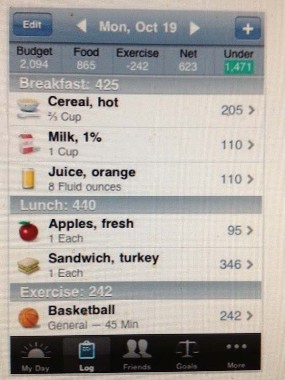User login
Americans spend about $35 billion each year on weight loss products. The industry capitalizes on consumers failing with one weight loss intervention and moving onto the next. Competition abounds for the most outrageous claims since a large portion of this industry is not regulated by the Food and Drug Administration.
There is no shortage of technology-based products that tout the ability to help patients lose weight. So when patients ask about these products, what should we say?
Virginia A. Reed, Ph.D., of Geisel School of Medicine at Dartmouth, Hanover, N.H., and her colleagues conducted a meta-analysis evaluating the effectiveness of computers for weight loss to help us answer this question. Studies were included if they were randomized, controlled clinical trials; the intervention included computer-based education or support aimed at reducing weight or body mass index; the comparison group received a non–computer-based intervention; participants were adults; and the study evaluated changes in weight and/or body mass index. Studies were excluded if they focused on weight maintenance (J. Gen. Intern. Med. 2011;27:99-108).
Eleven randomized trials were included in the final analysis. In six studies, the computer-based tool was additional (that is, both groups received an identical intervention, but one group received an additional computer-based intervention), while five studies substituted a computer-based tool for a comparable intervention. Studies evaluated Web-based, computer-based, and handheld devices for self-monitoring of lifestyle and diet interventions. One study evaluated a wearable monitor.
When the computer-based intervention was additional, subjects in the computer-based tool group lost significantly more weight [weight mean difference (WMD) –1.48 kg; 95% confidence interval –2.52, –0.43]. Substituting a computer-based tool for a standard weight-loss intervention was not associated with significantly more weight loss. And interestingly, after removing one study from the analysis, substituting a computer-based tool for a standard weight-loss intervention was associated with significantly less weight loss (WMD 1.47 kg; 95% CI 0.13, 2.81).
The take home from this study is that computer technology is a great addition to weight-loss strategies, but a poor substitution for them. But as is often observed with the many available weight loss interventions, the effects are modest.
In general, factors found to be associated with successful long-term weight loss include long-term behavioral change and self-monitoring of weight. Many available computer programs are "one-dimensional" insofar as they address only weight monitoring or calorie intake but not both. The best advice for our patients may be to use a multimodal approach to weight loss that includes information about lifestyle change (such as, diet and exercise), calorie counting, and body-weight tracking.
Jon O. Ebbert, M.D., is a professor of medicine and a primary care clinician at the Mayo Clinic in Rochester, Minn. He declares having no conflicts of interest. The opinions expressed are solely those of the author. Contact him at ebbert.jon@mayo.edu.
Americans spend about $35 billion each year on weight loss products. The industry capitalizes on consumers failing with one weight loss intervention and moving onto the next. Competition abounds for the most outrageous claims since a large portion of this industry is not regulated by the Food and Drug Administration.
There is no shortage of technology-based products that tout the ability to help patients lose weight. So when patients ask about these products, what should we say?
Virginia A. Reed, Ph.D., of Geisel School of Medicine at Dartmouth, Hanover, N.H., and her colleagues conducted a meta-analysis evaluating the effectiveness of computers for weight loss to help us answer this question. Studies were included if they were randomized, controlled clinical trials; the intervention included computer-based education or support aimed at reducing weight or body mass index; the comparison group received a non–computer-based intervention; participants were adults; and the study evaluated changes in weight and/or body mass index. Studies were excluded if they focused on weight maintenance (J. Gen. Intern. Med. 2011;27:99-108).
Eleven randomized trials were included in the final analysis. In six studies, the computer-based tool was additional (that is, both groups received an identical intervention, but one group received an additional computer-based intervention), while five studies substituted a computer-based tool for a comparable intervention. Studies evaluated Web-based, computer-based, and handheld devices for self-monitoring of lifestyle and diet interventions. One study evaluated a wearable monitor.
When the computer-based intervention was additional, subjects in the computer-based tool group lost significantly more weight [weight mean difference (WMD) –1.48 kg; 95% confidence interval –2.52, –0.43]. Substituting a computer-based tool for a standard weight-loss intervention was not associated with significantly more weight loss. And interestingly, after removing one study from the analysis, substituting a computer-based tool for a standard weight-loss intervention was associated with significantly less weight loss (WMD 1.47 kg; 95% CI 0.13, 2.81).
The take home from this study is that computer technology is a great addition to weight-loss strategies, but a poor substitution for them. But as is often observed with the many available weight loss interventions, the effects are modest.
In general, factors found to be associated with successful long-term weight loss include long-term behavioral change and self-monitoring of weight. Many available computer programs are "one-dimensional" insofar as they address only weight monitoring or calorie intake but not both. The best advice for our patients may be to use a multimodal approach to weight loss that includes information about lifestyle change (such as, diet and exercise), calorie counting, and body-weight tracking.
Jon O. Ebbert, M.D., is a professor of medicine and a primary care clinician at the Mayo Clinic in Rochester, Minn. He declares having no conflicts of interest. The opinions expressed are solely those of the author. Contact him at ebbert.jon@mayo.edu.
Americans spend about $35 billion each year on weight loss products. The industry capitalizes on consumers failing with one weight loss intervention and moving onto the next. Competition abounds for the most outrageous claims since a large portion of this industry is not regulated by the Food and Drug Administration.
There is no shortage of technology-based products that tout the ability to help patients lose weight. So when patients ask about these products, what should we say?
Virginia A. Reed, Ph.D., of Geisel School of Medicine at Dartmouth, Hanover, N.H., and her colleagues conducted a meta-analysis evaluating the effectiveness of computers for weight loss to help us answer this question. Studies were included if they were randomized, controlled clinical trials; the intervention included computer-based education or support aimed at reducing weight or body mass index; the comparison group received a non–computer-based intervention; participants were adults; and the study evaluated changes in weight and/or body mass index. Studies were excluded if they focused on weight maintenance (J. Gen. Intern. Med. 2011;27:99-108).
Eleven randomized trials were included in the final analysis. In six studies, the computer-based tool was additional (that is, both groups received an identical intervention, but one group received an additional computer-based intervention), while five studies substituted a computer-based tool for a comparable intervention. Studies evaluated Web-based, computer-based, and handheld devices for self-monitoring of lifestyle and diet interventions. One study evaluated a wearable monitor.
When the computer-based intervention was additional, subjects in the computer-based tool group lost significantly more weight [weight mean difference (WMD) –1.48 kg; 95% confidence interval –2.52, –0.43]. Substituting a computer-based tool for a standard weight-loss intervention was not associated with significantly more weight loss. And interestingly, after removing one study from the analysis, substituting a computer-based tool for a standard weight-loss intervention was associated with significantly less weight loss (WMD 1.47 kg; 95% CI 0.13, 2.81).
The take home from this study is that computer technology is a great addition to weight-loss strategies, but a poor substitution for them. But as is often observed with the many available weight loss interventions, the effects are modest.
In general, factors found to be associated with successful long-term weight loss include long-term behavioral change and self-monitoring of weight. Many available computer programs are "one-dimensional" insofar as they address only weight monitoring or calorie intake but not both. The best advice for our patients may be to use a multimodal approach to weight loss that includes information about lifestyle change (such as, diet and exercise), calorie counting, and body-weight tracking.
Jon O. Ebbert, M.D., is a professor of medicine and a primary care clinician at the Mayo Clinic in Rochester, Minn. He declares having no conflicts of interest. The opinions expressed are solely those of the author. Contact him at ebbert.jon@mayo.edu.

